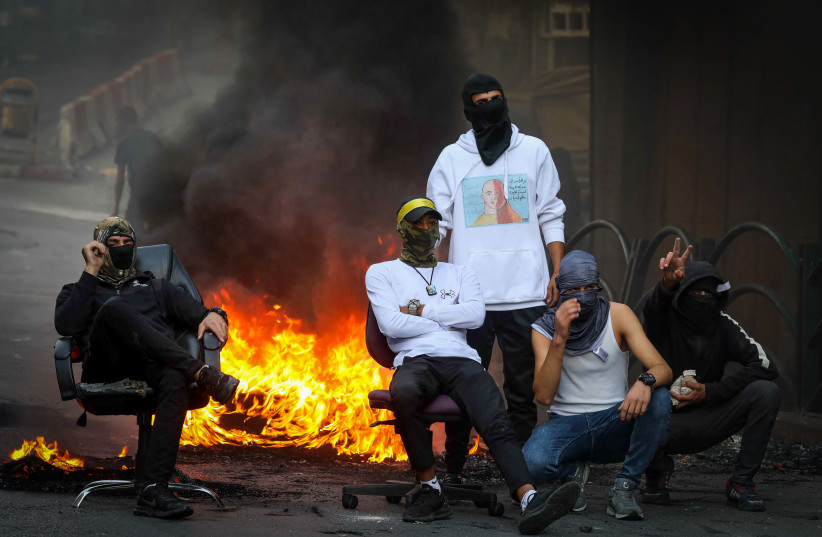There’s something new and disturbing happening in Israel of late.
In addition to an uptick in terror attacks that have wounded and killed many innocent Israelis, we are seeing an increase in vigilantism being perpetrated by Jewish residents of the West Bank against Palestinian villages.
Were the situation reversed and were these attacks perpetrated by Palestinians against a Jewish town, they would be vociferously and rightly labeled as “terror” by a near-unanimous swath of Israel’s elected elite.
Yet somehow, when the victims are Palestinians and the perpetrators Jews, the condemnation is far from unanimous. To be sure, there are important voices like those of the heads of the Shin Bet, the military, and the police declaring that these attacks are “nationalist terrorism in the full sense of the term.”
But, there are also voices in the leadership of Israel’s governing coalition such as Finance Minister Bezalel Smotrich and National Security Minister Itamar Ben-Gvir who bristle at the very idea of labeling attacks by Jews as “terror.”

Far-right does not attempt to disguise bias
Smotrich tweeted in response to the statement by the security chiefs that “the attempt to create an equivalency between murderous Arab terror and [Israeli] civilian counter-actions, however serious they may be, is morally wrong and dangerous on a practical level.”
Riotous attacks by Jews, which include setting fire to homes and cars and assaulting innocent civilians are labeled as mere “counter-actions.” Can you imagine the outcry were worldwide media outlets to label Palestinian terror attacks as “counter-actions?”
While the reactions of Israel’s far-right ideologues are bad enough, unfortunately, it is to be expected as these men have made no pretense regarding their biases. What is even more concerning, however, is when the man who is at the forefront of the recent effort to reform Israel’s judicial system joins the fray.
Not only has Simcha Rothman, chair of the Knesset’s Constitution, Law, and Justice Committee, joined with Smotrich and Ben-Gvir in minimizing the attacks on Palestinian towns, but he has taken it a step further and perniciously attempted to create an equivalence between horrific violence and peaceful protesting.
Since the inception of the overwhelmingly peaceful anti-reform protests that began in January, Rothman has been a vocal member of a chorus of leaders from Israel’s ruling coalition who have consistently demonized the protesters as anarchists and malcontents who won’t accept the results of an election.
Thus, it is not surprising that he’d attempt to use actual violent riots to further denigrate the protesters and their legitimate concerns.
Riots and reforms
In response to the riots, Rothman was recently quoted as saying, “Stop this posing immediately. As soon as you protest against the reform, you are allowed to call for arms and be violent, but if you are protesting about a petty and small matter that four people were murdered – then it’s wrong?”
Notice what Rothman has done here. He has insidiously reduced the Jewish riots to mere “protests.” Once that’s done, he then creates a neat parallel between hundreds of actual marauding rioters and hundreds of thousands of peaceful protesters.
To be fair, Rothman, being an attorney, cleverly inserts a bit of deniability by referring to the handful who have said that future violence, “a call to arms”, might be warranted. But that technicality fools nobody.
The syllogism is clear. If rioting Jews causing massive property damage are “protesters” and hundreds of thousands of people coming out week after week to oppose his precious reforms are “protesters,” then they are all the same.
If Rothman were just another political hack such a maneuver would be bad enough, but given his role in crafting the judicial reforms it is a grave concern, a red flag for us all. Rothman wants us to believe that his reforms are intended to make Israel more democratic. Yet, hundreds of thousands of Israelis have shown, through weekly protests, that they believe the opposite is true.
Reasonable and intelligent people on both sides of the debate have written countless words defending and critiquing the proposed reforms. Among the best I’ve read are those by Netta Barak-Corren, a law professor (against), and attorney Yechiel Oren-Harush (in favor). Both of these delve into the history of Israel’s judicial system and both make strong cases for why some reform is needed.
The difference is that Barak-Corren believes that Israel’s underlying system of governance is weak – lacking a constitution, bicameral legislature, and true separation powers – making the reforms, as proposed, a serious threat to Israel’s already feeble democratic structure.
She hues strongly to the US robust system of checks and balances. Oren-Harush, on the other hand, while acknowledging the risks, wants us to trust a very flawed and tenuous system to continue to protect our democracy.
What the founding fathers of the United States clearly understood is that we cannot and should not blindly trust our leaders. They put in place numerous guardrails so the people wouldn’t have to.
The words and actions of people like Rothman, Smotrich, Ben-Gvir, et al, those pushing hardest for these reforms, have ironically, over the past few months, made it abundantly clear why these judicial reforms, as proposed, are so very dangerous to the future of Israel as a free and democratic nation.
And, most recently, faced with massive violence by members of the majority population against a minority, their reactions expose their true colors and further, prove why the reforms most of us know we need must strengthen our guardrails, not weaken them.
The author made aliyah in 2004 from New Jersey to Beit Shemesh. He currently works as a tech liaison for a financial website.
